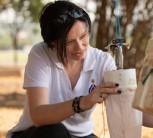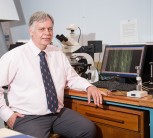Professor Tiaan de Jager is serving his second term as Dean of the Faculty of Health Sciences at the University of Pretoria (UP). He is a professor in Environmental Health at UP’s School of Health Systems and Public Health (SHSPH) and holds an Extraordinary Professorship in the section Andrology at the University’s Department of Urology, School of Medicine.
Prof De Jager, who completed his undergraduate studies at Free State University, says his research interest was piqued in 1993 when he became a medical natural scientist at UP’s Department of Urology in the Faculty of Health Sciences and its academic partner Steve Biko Academic Hospital. His research career officially kicked off when he enrolled for a PhD in Reproductive Biology at UP in 1995.
He is doing research at the University because it is a leading research institution that is not only graduating the leaders of tomorrow but has as its vision the creation of new knowledge with the aim of making a difference locally and globally. Prof De Jager says he is proud to be part of this visionary institution and fortunate to be able to lead and conduct research within this framework. “We focus our activities and contribution to making an impact on society above all else,” he says. “It is important to me that we graduate students who are not only good at their jobs and well educated, but who also understand that they have a responsibility to be life-changers and that they need to impact society and contribute positively to change in Africa.”
The attainment of the 2030 Agenda for Sustainable Development Goals (SDGs) is a common thread throughout Prof De Jager’s research, which places a specific focus on SDG 3 (Good Health and Well-being). “My primary research focus is on male reproductive health, specifically related to environmental health and toxicology,” he explains. “I investigate the effects of environmental endocrine-disrupting chemicals (EDCs), including insecticides used for malaria vector control, such as dichlorodiphenyltrichloroethane (DDT), on male reproductive health.”
The link between male reproductive health and malaria control has resulted in several international research projects that deal with the impact of malaria and associated malaria control on communities where the disease is prevalent, including South Africa, Botswana, Zimbabwe, Mozambique and Malawi. These novel research concepts are fed into safer malaria control strategies, which include drug discovery solutions; policy and regulatory framework intervention; prevention with public health partners; and education and awareness raising.
Prof De Jager is the Director of the UP Institute for Sustainable Malaria Control (UP ISMC), which is a prime example of cross-faculty research. This transdisciplinary institute involves all nine UP faculties as well as the Gordon Institute of Business Science school. The UP ISMC coordinates and promotes collaborative research on safer, more sustainable malaria control and management strategies, generates new knowledge and supports new activities pertaining to safe malaria control in Africa.
“Our interactions and collaborations, however, are not limited to the confines of UP, but includes partners from all spheres,” Prof De Jager says. “This includes communities, government, private industry, and international partners based at research institutions, higher education institutions and science councils.”
As Director of the UP ISMC, Prof De Jager’s main agenda is researching and coordinating efforts to bring about sustained control, eventually leading to the elimination of malaria, starting in South Africa and extending to neighbouring countries like Botswana, Mozambique, Zimbabwe and Malawi.
“Communities affected by malaria need to take responsibility for the control of mosquito vectors and the prevention of bites, while healthcare providers need to take responsibility for early-warning systems and treatment to alert communities to the presence of possible outbreaks,” says Prof De Jager.
Vector control efficacy and malaria treatment services rely on the commitment of and buy-in from provincial and national governments, as poor communities are unable to carry the costs themselves.
In South Africa, malaria is most prevalent in the Vhembe District in Limpopo. Here, malaria control policies rely on indoor residual spraying, using chemicals such as DDT and pyrethroids to control mosquito vectors. “Based on the evidence of the danger that DDT poses to both human (Bornman et al. 2018) and natural ecosystems, we have started developing and exploring alternative methods of control,” Prof De Jager explains. “In the Vhembe District, we have tested indoor polyethylene wall linings impregnated with long-lasting insecticides, with great success (Kruger et al. 2015), and in Botswana and Zimbabwe, we have field-tested the efficacy of microbial larvicides to control mosquito larvae (Mpofu et al. 2016). Both these methods have the potential to be effective if local communities are supported by municipal and provincial agencies based on sound research methodologies.”
The institute has seen several highlights over the past few years, one of the most recent being a breakthrough in 2020 amid the challenges brought on by the COVID-19 pandemic. “We had a breakthrough relating to drug discovery, where we were trying to find compounds to block the parasite interaction,” Prof De Jager explains. “Our research group, under the lead of Prof Lyn-Marie Birkholtz along with local and international partners, focused their research on the parasite and found specific drug compounds that can be effectively used as part of an intervention. This is a major breakthrough in terms of our malaria research.”
Other highlights span a longer period; a few noteworthy examples include the UP ISMC being designated as one of three South African Medical Research Council-collaborating centres for malaria research in the country; the UP ISMC being host to the DSI/NRF SARChI Chair on Sustainable Malaria Control (Prof Birkholtz); and the institute being named winner of the Communication for Outreach and Creating Awareness of SET and Innovation Award at the 2017/2018 NSTF-South32 Awards.
Some of Prof De Jager’s personal research highlights include successfully graduating several postgraduate students. Also, many of his students have won awards at the annual Faculty Research Day where their research projects were presented. His appointment as an expert peer reviewer of the World Health Organisation’s (WHO) ‘Global assessment of the state of the science of endocrine disruptors’ document was another highlight, as was his appointment by the National Minister of Health to the South African Malaria Elimination Committee.
Over the past 18 months, Prof De Jager says he has dedicated his time to further developing and growing the UP ISMC, with the long-term aim of malaria control and elimination. Various experts and role players from UP and government are currently involved. “The UP ISMC is developing safer alternatives for malaria control, including chemical product design/development, which includes WHO Phase II and III Field Trials on new patents for malaria vector control [Prof Walter Focke, Chemical Engineering], health impact/toxicology/health risk [Prof Riana Bornman, SHSPH, who Prof De Jager credits as his research mentor] and integrated vector management/decision tools and policy [Dr Clifford Mutero, SHSPH and Duke University].
“To take this into the future, and using opportunities created by big data sciences, we have introduced an initiative using remote sensing for malaria control (ReSMaCA) in collaboration with the French and South African national space agencies (CNES and SANSA), and national, regional and other international researchers. This approach takes climate change into account when developing early-warning systems for malaria. The programme will focus on environmental and climate issues, and will include vector and parasite control strategies, with a strong focus on cross-border malaria transmission. With funding from the German Research Foundation, we are also working on assessing the controlled release of volatile mosquito repellents from nanostructured polymers to reduce infectious tropical diseases including malaria. These initiatives focus on innovative approaches to malaria elimination in the African region and will involve researchers from developing countries facilitating capacity building and contributing towards the development of the African continent.”
Prof De Jager adds that an international project on malaria insecticides and reproductive health, funded by the Canadian Institutes of Health Research, laid the foundation for projects in Chiapas in Mexico, Quebec City, Canada, and later in Limpopo, further driving his special interest in malaria-related research.
His research agenda will continue to focus on questions related to the SDGs, particularly on EDCs, malaria control and the environment. “My passion is to continue being a life-changer through my contribution to research, making a difference in society and battling for a better life for our vulnerable, poor communities.”
More from this Researcher
Professor Riana Borman’s research seeks to understand the effects of endocrine-disrupting chemicals (EDCs) on human and environmental health, with a special focus on male reproduction. Most of her research is carried out in the rural areas of the Vhembe District in Limpopo, in communities where insecticide is sprayed to control malaria-carrying mosquitoes.
She began her career in the Department of Urology at the University of Pretoria (UP) in 1980 and had a research topic to explore within the first week, which triggered a career-long curiosity. “I am still researching the role of EDCs on human health today,” she says.
Prof Bornman, who obtained an MBChB at UP, says her research focus developed from her experiences in managing patients in clinical settings. “As a clinical physician, I realised that human and environmental health was intricately affected by environmental pollution, especially exposure to EDCs. Being a clinician at UP has created unique opportunities to conduct research in the Limpopo province.”
Her field of research addresses the unintentional health consequences of annual indoor residual spraying of insecticides to control malaria-carrying mosquitoes. In the Vhembe District, dichlorodiphenyltrichloroethane (DDT) is sprayed to control these mosquitoes and reduce cases of malaria and death. While DDT is largely a banned chemical, according to the Stockholm Convention on Persistent Organic Pollutants, it is allowed in some countries, including South Africa, for malaria vector control.
But there is growing concern around the adverse health effects associated with DDT. Scientific evidence from South Africa is crucial and contributes to the body of evidence that is calling for safer alternatives to DDT for malaria vector control.
The chemical is effective for about six months and needs to be sprayed every year. Prof Bornman’s research shows that annual spraying has negative, long-term consequences for pregnant women and young children. “We are seeing these consequences in children, possibly persisting into future generations, suggesting long-term health effects. Our research collects important irrefutable scientific evidence of the health impacts of EDCs in communities exposed to insecticides.”
Prof Bornman is the co-principal investigator for the Venda Health Examination of Mothers, Babies and the Environment (VHEMBE) study, which is being conducted in collaboration with Prof Brenda Eskenazi of the University of California, Berkeley in the US and Dr Jonathan Chevrier of McGill University, Canada. The VHEMBE study is the first birth cohort from a population that is currently exposed to DDT via annual spraying and is the biggest longitudinal birth cohort from Africa. The study group recruited and enrolled 752 mother-child pairs at Tshilidzini Hospital in Thohoyandou and have monitored the children up to eight and a half years of age for various possible health impacts.
She hopes to continue doing research that contributes to improving the health of those whose voices are not often heard.
She is also co-principal investigator and clinical leader of the South African Prostate Cancer Study, which is investigating the genomics of prostate cancer in African men; this is being done in partnership with Prof Vanessa Hayes, Scientific Director of the Garvan Institute of Medical Research in Sydney, Australia. A recent highlight in their research work has been funding awards from major international bodies to investigate the development of aggressive prostate cancer in black African men. “We are extremely motivated to continue with this research,” says Prof Bornman. “Successful awards reflect that the scientific leaders in our field support our approach.”
Over the past 18 months, the prostrate cancer study group began a new project that focuses on the mutational signatures of DDT and the possible role of this EDC on prostate cancer aetiology. Prof Bornman is also the study leader for a new study on knowledge, attitudes and practices of traditional healers, primary healthcare service providers and men in the rural Vhembe District.
She says in her research work she was inspired by Prof Dion du Plessis, former Head of Urology and Dean of the Faculty of Health Sciences at UP, who taught her to think beyond the obvious, to dream big and to just DO it!
Her academic role model was Prof Carl Franz, former Head of Surgery at UP. He was a prime example of how to integrate laboratory and clinical medicine in an academic career, she says.
Her message to school learners or undergraduates who are interested in her field is: “Every one of us, irrespective of our discipline, can make a difference in the lives of people. My research aims to improve the lives of people living with the constant threat of malaria under unforgiving environmental and socio-economic conditions. We can all do research that makes a difference. One just has to care enough about people.”
Her hobbies are photography and travel.
More from this Researcher
Dr Taneshka Kruger has been doing research at the University of Pretoria (UP) since 2012, which was when she did her postdoctoral fellowship on an innovative malaria mosquito vector control method. She joined the UP Institute for Sustainable Malaria Control (ISMC) as project manager and coordinator in the same year. Dr Kruger is also responsible for marketing the institute, and her research focus contributes to this.
Her research focus is innovative and novel malaria education and health promotion as proactive malaria transmission prevention methods and strategies. A large proportion of malaria deaths occur annually in children under five years of age. Dr Kruger’s research and communication initiatives often have her working directly with malaria-endemic communities, especially with young children of primary school age, in the rural Vhembe District in northeast Limpopo. The aim is to raise malaria awareness and to teach children how to prevent contracting the disease.
Malaria is still a major public health concern, with hundreds of thousands of people dying annually from the disease, despite it being both preventable and treatable. Dr Kruger says her research matters because it contributes towards proactive malaria prevention strategies, specifically identifying novel education and health promotion interventions that have the potential to contribute towards malaria elimination.
Dr Kruger is part of a cross-faculty research team at UP. In her capacity as project manager and coordinator at the UP ISMC, she works with a variety of researchers that specialise in many interesting fields and with a focus on malaria elimination. She recently collaborated with Dr Megan Riddin – of UP’s School of Health Systems and Public Health, and medical entomologist at UP ISMC – on mosquito vector biology and innovative control; Professor Walter Focke, of the Department of Chemical Engineering, on innovative malaria/mosquito repellents and control methods; and Prof Irma Eloff, of the Department of Education Psychology, on the use of culturally and age-appropriate songs to educate children about malaria.
A recent research highlight for her was determining the most effective malaria intervention education method in primary schools. This research will be expanded further in the following year.
Dr Kruger regards Prof Riana Bornman, senior research professor in the School of Health Systems and Public Health, as an inspiration because she is so devoted to what she does, which includes working with rural malaria-endemic communities. Dr Kruger adds that Prof Tiaan de Jager, director of the UP ISMC and Dean of the Faculty of Health Sciences, is her academic role model because of his vision to establish the transdisciplinary research entity that has brought together researchers from various disciplines working towards the elimination of malaria.
Her advice to school learners or undergraduates who are interested in her field is to identify the one thing about this field, or any research field, that generates excitement for them, because that makes the hard work and challenges worth the while. She adds that by focusing on the one thing that brings joy, the rest will fall in place.
In her spare time, Dr Kruger enjoys scuba diving.
More from this Researcher
Professor Focke holds BEng and MEng degrees from the University of Pretoria (UP) and a PhD from the Massachusetts Institute of Technology. In 1997, he joined UP, where he is Director of the Institute of Applied Materials.
Prof Focke says that there are ample opportunities to engage in multidisciplinary research at UP. “The Institute for Sustainable Malaria Control is an excellent example of a vehicle that makes this possible,” he says. “It brings together medical researchers, scientists, engineers, entomologists, economists, artists and so forth, allowing them to collaborate to achieve a common goal – the elimination of malaria.”
Prof Focke’s current research interest is push-pull insect control, with a focus on controlled release devices for attractants and repellents.
His earlier materials research centred on chemical and polymer technology, while his carbon technology research explored the use of graphite in energy applications and as a flame-retardant additive for plastics. Work on clay and polymer additive technology was targeted towards additive applications in polymers in order to improve thermo-oxidative stability and flame retardancy, to facilitate the controlled release of actives, especially for malaria vector control and to modulate moisture transmission through polymer films. The objective of his pyrotechnics research was to develop “green” compositions for use as time delays and to initiate compositions in chemical mine detonators.
Within his academic discipline, Prof Focke works mainly on controlled release devices to enable malaria vector control and push-pull insect control in agriculture. Cross-faculty, the malaria vector control activities involve researchers from several departments and faculties.
Prof Focke’s field of research contributes to the betterment of the world because eliminating malaria will reduce suffering in sub-Saharan Africa and improve public health. He adds that push-pull insect control holds the promise of more sustainable agricultural practices.
A recent highlight for the professor was the development of bicomponent fibre technology, which enables active textiles. Dr Mthokosizi Sibanda, who was the main driver of this technological development, established African Chemicals, a high-technology business, to exploit this intellectual property. African Chemicals is developing various textile-based products with insecticidal or insect repellence properties.
Prof Focke was prompted to determine whether the Institute for Sustainable Malaria Control could help to reduce the burden of malaria by applying chemical engineering principles to malaria vector control after both his son-in-law and one of his grandchildren were admitted to intensive care upon contracting malaria.
His research matters, he says, because it aims to address real-world problems and, in the process, train high-level men and women who can contribute to the economic development of South Africa.
His advice to school learners or undergraduates who are interested in his field is to find an area that interests and excites them, as that is the secret to a successful career.
In his free time, Prof Focke enjoys walking in the veld with his dogs, collecting rocks and taking pictures of wildflowers.





 Story
Story
 Infographic
Infographic
 Story
Story
Get Social With Us
Download the UP Mobile App